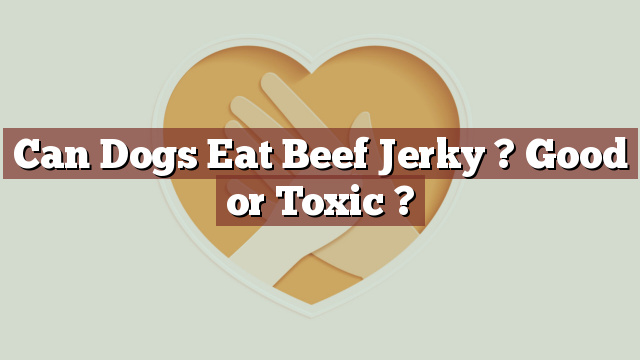Can Dogs Eat Beef Jerky? Good or Toxic?
When it comes to our furry friends, it is important to be mindful of what we feed them. Many pet owners wonder if it is safe to share certain human foods with their dogs. One such food that often raises questions is beef jerky. In this article, we will examine the nutritional value, potential risks, and benefits of feeding beef jerky to dogs.
Nutritional Value of Beef Jerky for Dogs
Beef jerky is a popular snack among humans, but what about our canine companions? Beef jerky is made from lean cuts of beef, which means it is high in protein. Protein is an essential nutrient for dogs as it helps to build and repair tissues, supports a healthy immune system, and promotes muscle growth. Additionally, beef jerky contains vitamins and minerals such as iron, zinc, and B vitamins, which are important for your dog’s overall health.
Can Dogs Eat Beef Jerky? Is it Safe or Toxic?
While beef jerky may seem like a tasty treat to share with your dog, it is important to exercise caution. Dogs can eat beef jerky, but it is not always safe for them. Many store-bought beef jerky products are heavily processed and contain added ingredients such as spices, seasonings, and preservatives, which can be harmful to dogs. Some of these additives, such as onion powder or garlic powder, can be toxic to dogs and may cause digestive upset or even more serious health issues.
Potential Risks and Benefits of Feeding Dogs Beef Jerky
Feeding beef jerky to your dog can have both risks and benefits. As mentioned earlier, some store-bought beef jerky products may contain harmful additives. However, if you choose to make homemade beef jerky for your dog, you can control the ingredients and minimize the risks. Homemade beef jerky made from lean cuts of beef without any added spices or seasonings can be a nutritious and safe treat for your furry friend.
It is also important to consider the potential risks associated with feeding dogs any type of jerky. Jerky treats, including beef jerky, can be tough and chewy, which may pose a choking hazard or lead to dental issues. Additionally, the high salt content in some beef jerky products can be harmful to dogs, especially those with certain health conditions such as kidney disease or heart problems.
What to Do if Your Dog Eats Beef Jerky
If your dog accidentally consumes store-bought beef jerky or exhibits any symptoms of illness after eating it, it is crucial to seek veterinary advice immediately. The symptoms of onion or garlic poisoning in dogs can include vomiting, diarrhea, weakness, and even anemia. A veterinarian will be able to assess the situation and provide appropriate treatment if necessary.
Conclusion: Weighing the Risks and Benefits of Beef Jerky for Dogs
In conclusion, while dogs can eat beef jerky, it is essential to approach this treat with caution. Commercially sold beef jerky with added ingredients can be toxic to dogs, especially if it contains onion or garlic powder. However, if you choose to make homemade beef jerky without any harmful additives, it can be a nutritious and safe snack for your canine companion. It is always best to consult with your veterinarian before introducing any new food into your dog’s diet to ensure their safety and well-being.
Thank you for investing your time in exploring [page_title] on Can-Eat.org. Our goal is to provide readers like you with thorough and reliable information about various dietary topics. Each article, including [page_title], stems from diligent research and a passion for understanding the nuances of our food choices. We believe that knowledge is a vital step towards making informed and healthy decisions. However, while "[page_title]" sheds light on its specific topic, it's crucial to remember that everyone's body reacts differently to foods and dietary changes. What might be beneficial for one person could have different effects on another. Before you consider integrating suggestions or insights from "[page_title]" into your diet, it's always wise to consult with a nutritionist or healthcare professional. Their specialized knowledge ensures that you're making choices best suited to your individual health needs. As you navigate [page_title], be mindful of potential allergies, intolerances, or unique dietary requirements you may have. No singular article can capture the vast diversity of human health, and individualized guidance is invaluable. The content provided in [page_title] serves as a general guide. It is not, by any means, a substitute for personalized medical or nutritional advice. Your health should always be the top priority, and professional guidance is the best path forward. In your journey towards a balanced and nutritious lifestyle, we hope that [page_title] serves as a helpful stepping stone. Remember, informed decisions lead to healthier outcomes. Thank you for trusting Can-Eat.org. Continue exploring, learning, and prioritizing your health. Cheers to a well-informed and healthier future!

